#duke exeter
Explore tagged Tumblr posts
Text

Duke Exeter is the leader of the Sentinel faction and Grand Commander of the soldiers of the Nexus Force.
A noble man driven by principle and duty, he will stop at nothing until his mission is complete... But in the fight against the Maelstrom? The whole universe is at stake, failure isn't an option for him.
And when innocents die, after he sees he's unable to save them all? What will he sacrifice to achieve victory?
After all, he can't afford to fail. No matter what it takes.
3 notes
·
View notes
Text
The prince began by referring to his father’s recently declared intention of leading an expedition to recover the duchy of Aquitaine. In the hope that his eldest son would accompany him, Henry had specified the number of men who were to serve under the prince in France. However, the prince came to the conclusion, ‘in consequence of mature consideration’, that ‘the number assigned was so small as to have virtually excluded all possibility of either serving our father honourably or providing effectively for the security of our own person.’ He therefore asked the king to allow him ‘to confer in a certain place or lordship of ours, with kinsmen, retainers, and friends, and other servants of ours’ in order that such a conference might ‘discover ways and means of increasing the number assigned to us.’ According to the prince, his father ‘cordially agreed‘ to this request. However, while the prince and his friends were making their way to Coventry to hold their discussions, ‘neither supported by an armed following nor encouraged by popular tumult’, certain evil-minded persons, whose ultimate aim was ‘to disturb the line of succession' suggested to the king and many of the lords that the prince was about to raise an insurrection and attempt to seize the throne. These slanderers also claimed that he was ‘making every attempt to obstruct the expedition to the duchy of Aquitaine. In answer to these accusations, the prince declared his unwavering affection, love, loyalty and submissiveness towards his father, and pledged his full support to the king’s policy. The intrinsic importance of this letter lies in its references to nearly every possible aspect of the debate upon relations between Henry IV and his eldest son, including the prince’s attitude to the Armagnac alliance, the question of whether he ever intended to persuade or compel his father to abdicate, and the problem posed by his ‘detractors’. At the very least, it proves that these three highly contentious issues were being openly aired during Henry IVs lifetime. Any assessment of the prince’s actions and motives must reflect the degree to which one is prepared to accept the truthfulness of his statements and the sincerity of his protestations.
Those who have attempted such an evaluation appear, however, to have been unaware of the potential significance of the passage in the St. Albans Chronicle which immediately precedes the prince’s letter. This states that the king’s advisers persuaded him not to go to France in person because of his ill-health, and to appoint his son Thomas leader of the expedition. Walsingham’s statements that Henry IV did not lead the expedition, and that Thomas did, are simple and well-authenticated facts, but his juxtaposition of this passage and the prince’s letter, if intended to represent the true sequence of events, has profound implications. Historians have perhaps neglected these implications on the grounds that medieval authors were notoriously liable to take liberties with chronology. However, Thomas’s formal appointment as leader of the expedition can be precisely dated by reference to documents which have been available in a readily accessible printed form for over two centuries. An indenture between the king and Thomas, authorizing the latter to serve in France with 1000 men-at-arms and 3000 archers, is dated 8 June 1412. Any possibility of error is excluded by the additional information that Thomas’s army was to muster at Southampton on 6 July, a date in itself somewhat earlier than that on which it has been commonly assumed that Thomas received his command. Further confirmation is provided by royal letters of protection issued on 12 June to men intending to sail with Thomas. It seems particularly significant that the number of men assigned to Thomas was exactly that which his father had undertaken, in the treaty of 18 May, to send to fight alongside the Armagnacs, and these troops may therefore be assumed to have been the mainstay of the expeditionary force. Moreover, as it was specifically stated that the Duke of York and Thomas Beaufort were to serve with Thomas in France it seems safe to conclude that no-one of higher rank than these three men was to take part in the enterprise.
Peter McNiven, "Prince Henry and the English Political Crisis of 1412", History, vol. 65, no. 213 (1980)
#henry iv#henry v#thomas duke of clarence#edward 2nd duke of york#thomas beaufort duke of exeter#the political crisis of 1412#historian: peter mcniven
3 notes
·
View notes
Text
Modern day Fancast for Henry V
Part 1 ( other parts in reblogs)
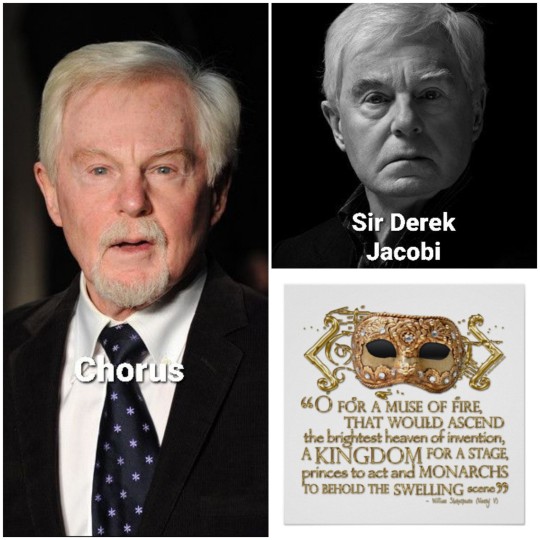
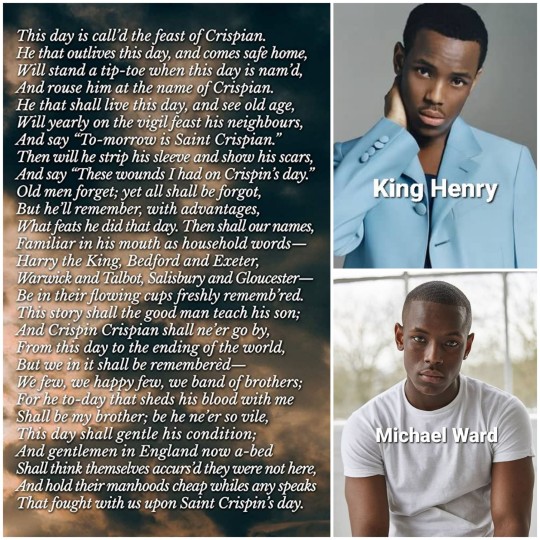
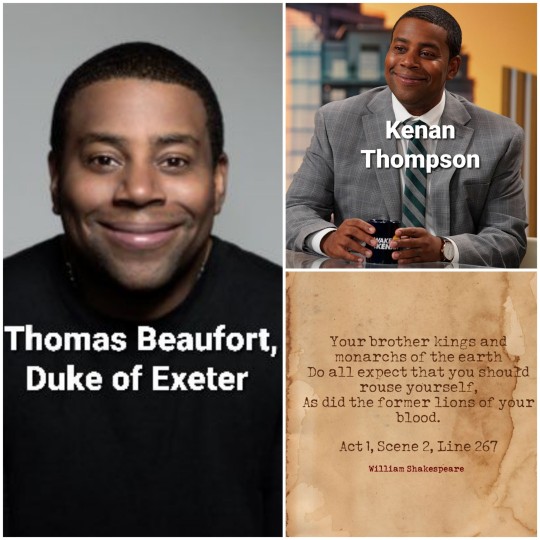

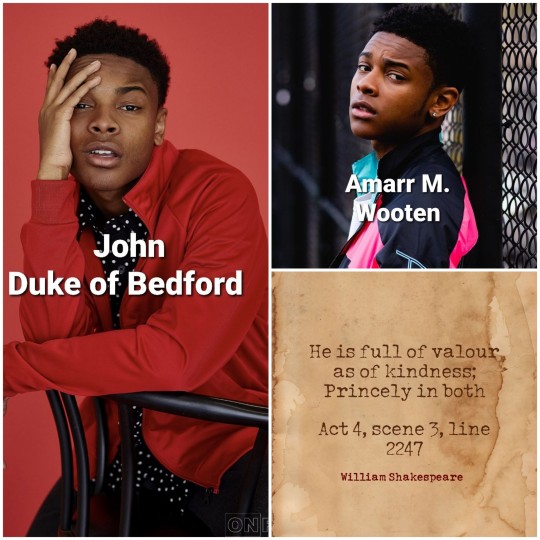


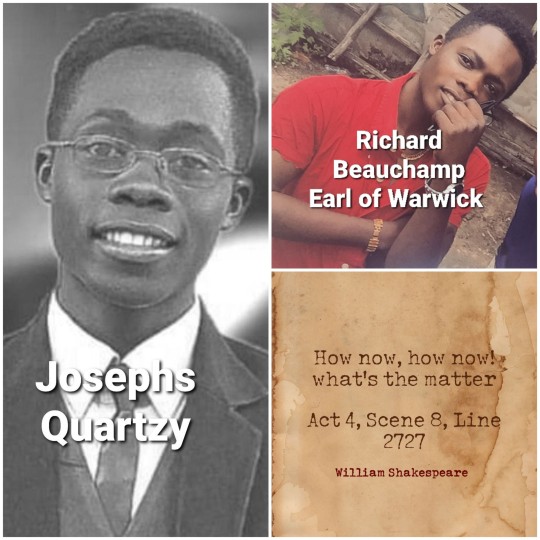


#Henry V#Shakespeare#theatre#Chorus#Derek Jacobi#Michael Ward#Exeter#kenan thompson#jonathan daviss#duke of gloucester#Duke of Bedford#Amarr m. Wooten#Duke of clarence#Benjamin Flores Jr.#Duke of York#Da'Vinchi#earl of Warwick#Josephs Quartzy#archbishop of Canterbury#ian mckellen#bishop of ely#Patrick Stewart#fancast#quotes#play
17 notes
·
View notes
Note
I was wondering - what was Anne of York, Duchess of Exeter's first marriage like? I'm a little confused because from what I understand, Henry Holland was described as "cruel and fierce" by Italian contempraries (I could be wrong), the couple appear to have been estranged and living separately, and clearly supported opposing sides in the conflict. So Anne of York was clearly unhappy/dissatisfied. And Charles the Bold apparently said that Edward IV gave orders to have Holland thrown overboard? Which seems likely as I don't think the guy could just...randomly drown?
Also, was Thomas St. Leger her lover even during her first marriage. Edward IV appears to have been pretty supportive/friendly to St. Leger and from what I understand, their relationship doesn't seem to have been very secretive?
I'm very confused sorry
Hi! I don't know if I'm the right person to answer, I don't know much about Anne of York and Henry Holland. I also think it's impossible for us to know what their early marriage was like. Clearly, it was an arranged marriage of convenience where her father the Duke of York married Anne, still very young, to one of Henry VI's potential heirs in hopes she would be queen if Holland was ever declared heir. That marriage didn't bring Holland into York's sphere of influence/support though and he remained loyal to Henry VI in his position as Duke of Exeter when York rebelled. He, along with Jasper Tudor and a few others remained diehard Lancastrians — there's a report saying Holland was so poor in his exile he went around Burgundy barelegged asking for food (how true that report/gossip is, remains questionable). It's possible Exeter's refusal to support Anne's father created a rift between them. During Holland's exile it is said Anne started living with Thomas St Leger in Holland's residences and it must have been supremely awkward during Henry VI's readeption when Holland returned to England.
After the readeption failed, Holland was imprisoned in the Tower of London and was only released to fight in the war with France, except he never returned to England even if the war never happened, as he was thrown overboard from his ship. It's impossible to separate his assassination from the fact that 1. he was a powerful duke who had always remained loyal to Henry VI; 2. he was a direct descendant of Edward III and a lancastrian heir who could rally around him dissidents opposed to Edward IV's regime. It wouldn't be correct to reduce it to Edward getting rid of him because of his potentially mean nature or because of whatever had happened in his marriage to Edward's sister, of course. Sorry, I don't know if we will ever know more about their intimacy.
#ask#anon#anne of york duchess of exeter#henry holland 3rd duke of exeter#edward iv#wars of the roses
8 notes
·
View notes
Link
HM the King has performed in Shakespeare’s plays, from Macbeth to the Duke of Exeter in Henry V at boarding school in Gordonstoun.
Find out more about HM the King’s connections to Shakespeare on our Charles III landing page where you can view an online gallery of items related to past coronations in the Shakespeare Birthplace Trust Collections.
2 notes
·
View notes
Text
At best, this couple is not friendly, at worst, they hate each other.
Anne of York .vs Duke of Exeter Henry Holland


#anne of york duchess of exeter#Duke of Exeter Henry Holland#english history#history#the war of roses
0 notes
Link
John Holland, 2nd Duke of Exeter, 2nd Earl of Huntingdon, was an English nobleman and military commander during the Hundred Years' War. His father, the 1st Duke...
Link: John Holland, 2nd Duke of Exeter
0 notes
Text
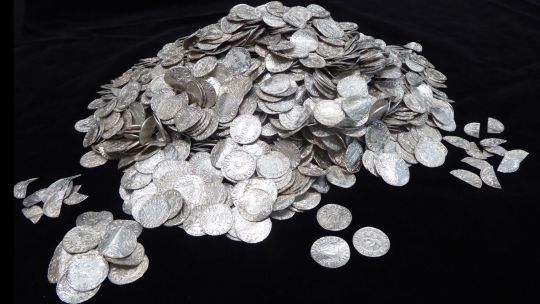
1,000-Year-Old Norman Conquest Coin Hoard Sells for $5.6 Million
A hoard of Norman-era silver coins unearthed five years ago in southwestern England has become Britain’s most valuable treasure find ever, after it was bought for £4.3 million ($5.6 million) by a local heritage trust.
For the group of seven metal detectorists who discovered the 2,584 silver pennies in the Chew Valley area, about 11 miles south of the city of Bristol, it marks a lucrative windfall since they will pocket half that sum. The landowner on whose property the coins were found will receive the other half.
According to South West Heritage Trust, the body that acquired them, the coins date from around 1066-1068, spanning one of the most turbulent periods in English history as the country was successfully invaded for the last time during the Norman Conquest.
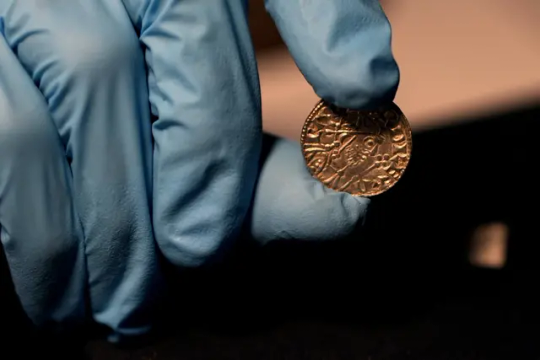
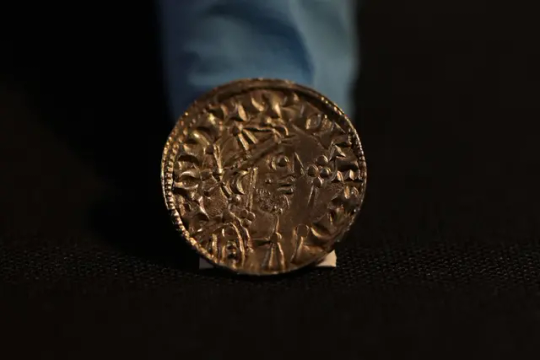
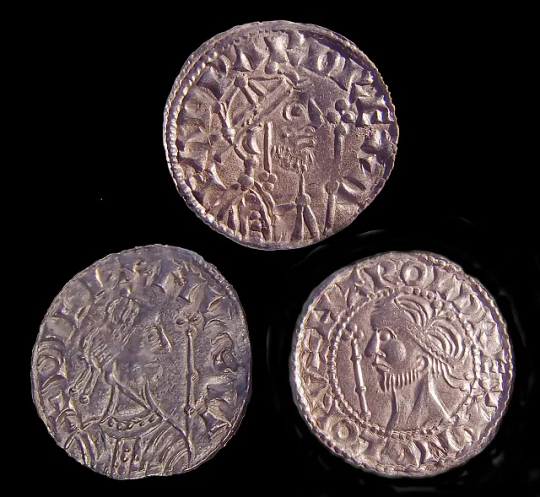
One coin, the oldest in the hoard, depicts King Edward the Confessor, who died childless in January 1066, triggering a period of instability since he had promised the throne to three claimants: Harold Godwinson, Earl of Wessex; Harald Hardrada, King of Norway; and William, Duke of Normandy.
Edward named Harold Godwinson as his successor on his deathbed, but the newly crowned King Harold II faced challenges from the other two claimants to the throne, and he was eventually defeated by William at the Battle of Hastings in October 1066.
The hoard of coins depicts this turmoil as Harold II features on just under half of them while William I (also known as William the Conqueror) features on the rest.
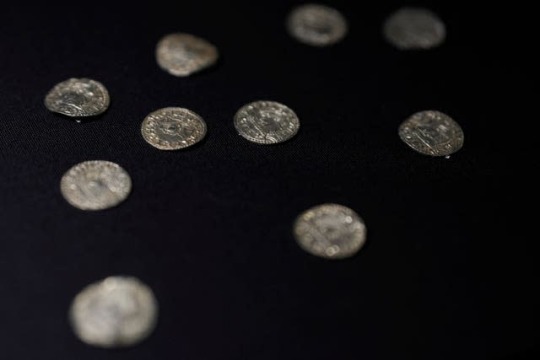
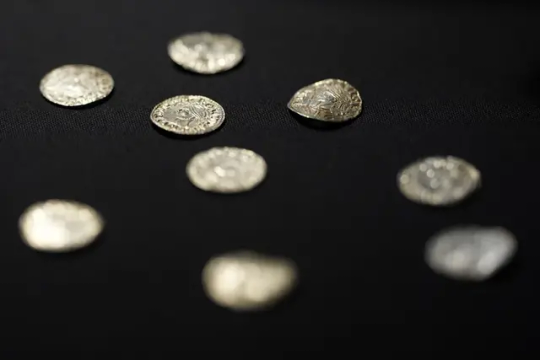
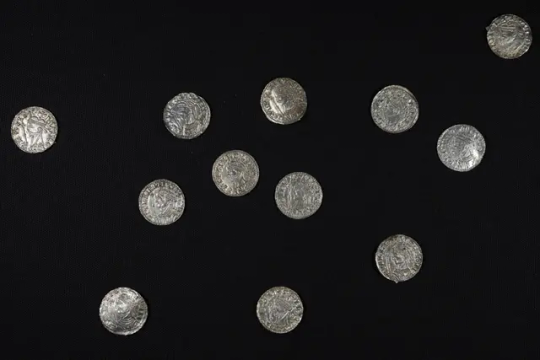
“It comes from a turning point in English history and it encapsulates the change from Saxon to Norman rule,” Amal Khreisheh, curator of archaeology at South West Heritage Trust, said in a video on the organization’s website.
“The hoard was buried in around 1067-1068 on an estate in Chew Valley which later belonged to Giso, the Bishop of Wells. We think it was probably buried for safekeeping during the time of rebellions against William in the South West.
“We know that in 1068, the people of Exeter rebelled against William. At around this time, Harold’s sons returned from exile in Ireland and their forces mounted attacks around the River Avon and then down into Somerset and the Chew Valley,” Khreisheh added.
Finding coins that were in use almost 1,000 years ago is exceptionally rare – this hoard contains twice as many coins from during Harold II’s reign as had previously been found.
The coins will now go on public display at the British Museum in London from November 26, before heading back to museums in southwest England.
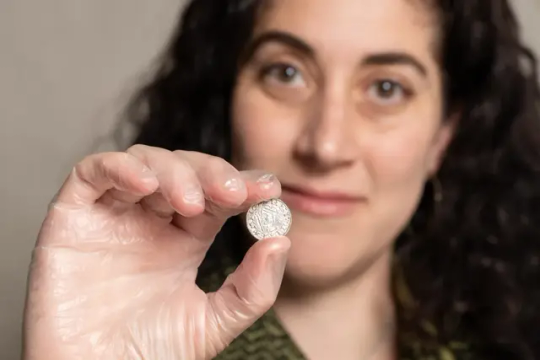
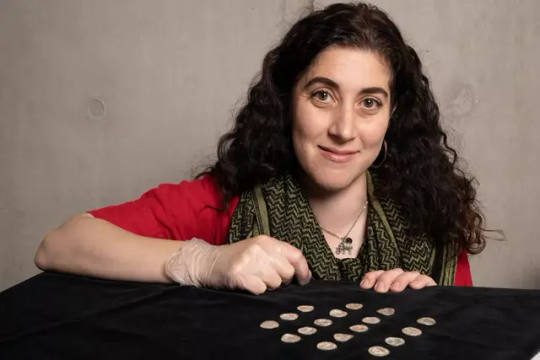
#1000-Year-Old Norman Conquest Coin Hoard Sells for $5.6 Million#Norman Conquest Coin Hoard#Norman Conquest#King Edward the Confessor#King Harold II#William Duke of Normand#William the Conqueror#treasure#silver#silver coins#collectable coins#metal detector#metal detecting finds#ancient artifacts#archeology#archeolgst#history#history news#ancient history#ancient culture#ancient civilizations
195 notes
·
View notes
Text
Dispatches documentary reveals shocking state of Duchy of Cornwall properties
ByNick SommerladInvestigations Editor
16:00, 2 Nov 2024
Scores of rental properties owned by Prince William fail to meet the minimum legal energy efficiency standards for landlords, we can reveal.
We found some of his tenants are at risk of fuel poverty, living in hard to heat homes that are riddled with damp and black mould. Our investigation with Channel 4 Dispatches has found that as many as one in seven of William’s inherited Duchy of Cornwall’s residential rental properties have the lowest Energy Performance Certificate ratings of F or G.
It comes as the taxpayer is funding a £369m renovation of Buckingham Palace and Prince William launches his campaign against homelessness and for “everyone having a right to a safe and stable home”. One tenant said: “The slick PR will stick in the throat of many tenants. He should start by bringing the homes he already owns up to modern standards.”
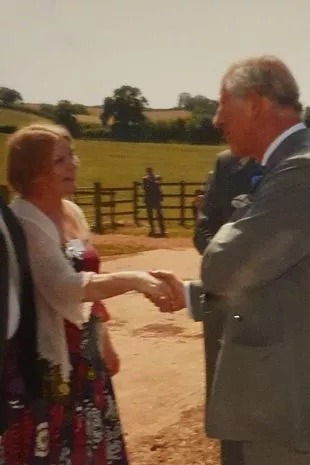
Claire Williams meeting William's father, King Charles
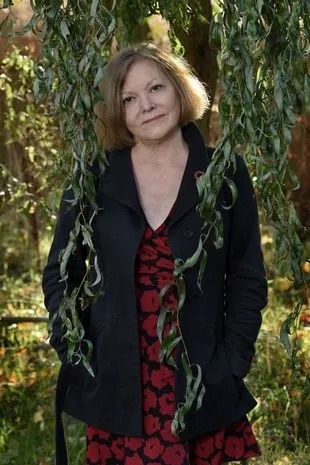
Tenant Claire Williams was evicted last week over rent arrears ( Image: MIKE ALSFORD/MWP)
The Duchy has more than 600 rental properties and over a 15-month investigation we identified nearly 500 of them. We found 50 Duchy properties rated F and 20 rated G, including six properties with the lowest EPC score of one point out of 100.
We spoke to a number of tenants on condition of anonymity who are living in cold, poorly insulated homes, often without central heating and many relying on the most expensive solid fuels for heat. It has been illegal since 2020 for landlords to rent out properties that are rated below an E under the Minimum Energy Efficiency Standards regulations without a valid exemption.
Since the new rules, Prince William and the previous Duke of Cornwall King Charles III have between them received £91m in profits from the Duchy. One tenant with no central heating spends hundreds of pounds a month on coal and wood to heat just two rooms in his house.
He told us: “It gets miserably cold especially in the winter, you can see through the roof. I can only heat two rooms in my home using a wood burner and a coal fire, and the landlord told me that my rent was going to be put up considerably if they put in radiators."

Claire's home is filled with damp and mould ( Image: MIKE ALSFORD/MWP)
He claimed: "There is mould appearing on soft furnishings and clothes because the air is so cold and damp. To make my property efficient it needs to be insulated but they won't do that because of the cost. But you don't want to say anything against your landlord for fear of eviction. There could be consequences.”
Another elderly tenant with no central heating and just one fireplace for warmth was under a blanket when we visited his home in early September. A third told us: “The house is freezing. We were told that it is uninhabitable. When the wind blows the curtains start swinging. There’s no heating upstairs at all.
“I asked about double glazing and they said Prince Charles doesn’t like it. Well he doesn’t have to live here.” A fourth said: “The house is cold and it is a struggle but there is nowhere else to live here. They are not good landlords.”
One Duchy tenant who let us take photos of her home is Claire Williams, 53, who was evicted last week over rent arrears – which she disputes. She says she wasn’t told when an energy assessor found her former farmhouse outside Exeter was rated F in 2015. But she says she has struggled with cold and damp since she moved in more than 20 years ago.
Parts of the house which are below the ground level feel wet to the touch and are covered in black mould that Claire says she has never been able to stop growing back. She said: “As much as I tried to cover it up with mould sealer it just comes back.

Some tenants have spoken of their poor living conditions ( Image: MIKE ALSFORD/MWP)

Prince William and King Charles at the Army Aviation Centre in Stockbridge, Hampshire, in May ( Image: Getty Images)
“Any wallpapering or any painting I do, after a couple of months it just peels off. I've complained about it for 21 years. The repaint was done about a week before I moved in so you couldn't see it.”
Claire says the house has become increasingly expensive to heat: “I have to heat the house where all the heat is going out windows. I have to pay an awful lot for oil. It is just so expensive when you know you are paying all this money into a property and it's heating outside.”
She used to pay £430 to fill her 3,000 litre oil tank, but it now costs £600 for just 500 litres that last only three months. "I can never afford to fill my tank," Claire added. She said she only found out about the poor EPC rating when she was asked to leave: “When I got my eviction letter, I phoned Citizens Advice.
“They checked it out on the internet and said 'It's an F, you shouldn't be living there. You shouldn't be paying to live there and it's illegal to let that property out'. I think the Duchy are saying that I've lived here too long. You can live in conditions that are dreadful because I have lived here too long.
“They don't seem to have any consideration for the people that have lived in their houses for a length of time. They try to save money on people's lives to gain money for themselves." After the Duchy began eviction proceedings against Claire, inspectors from Mid-Devon Council visited her home and served the Duchy of Cornwall with a "hazards awareness notice" over the conditions. They found "damp and mould growth" and "excess cold" throughout the property.
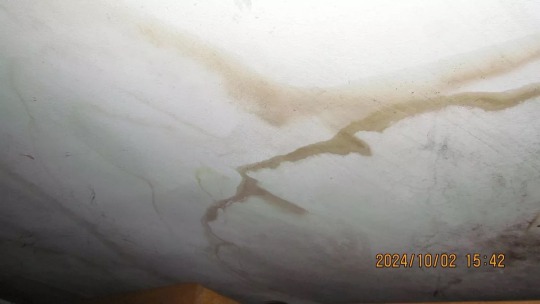
The conditions inside another Duchy of Cornwall property
The Duchy of Cornwall would not comment on Claire’s EPC but said it was a “responsible and compassionate Landlord” and only evicts tenants “in rare circumstances where all other alternatives have been exhausted”. A Duchy of Cornwall spokesperson said: “We are a responsible Landlord committed to continuous improvement of its properties. We work closely with our tenants to actively address energy efficiency of properties across our portfolio while minimising the impact on residents.
"The Duchy of Cornwall is a private estate with a commercial imperative which we achieve alongside our commitment to restoring the natural environment and generating positive social impact for our communities. Prince William became Duke of Cornwall in September 2022 and since then has committed to an expansive transformation of the Duchy.
“This includes a significant investment to make the estate net zero by the end of 2032, as well as establishing targeted mental health support for our tenants and working with local partners to help tackle homelessness in Cornwall.” We showed our dossier of evidence to EPC expert Andrew Parkin, director of Elmhurst Energy and chair of the trade body Property Energy Professionals Association, who said: “That does surprise me.
“I would kind of expect to see a very small landlord here as somebody who doesn’t really understand the regulations. Every landlord has a responsibility for the buildings that they own and the tenants that are in those buildings.
“The vast majority of people agree that we have to improve our building stock, not just for the people who live in those buildings, but also for the planet and for reducing our impact on the planet.” He examined a handful of EPCs from the Duchy’s rentals and said about one: “Well, this is the worst performing kind of property. It is more likely to be a cold, draughty, hard to heat property. It certainly will be expensive to heat the property … the rating is is very, very low indeed.
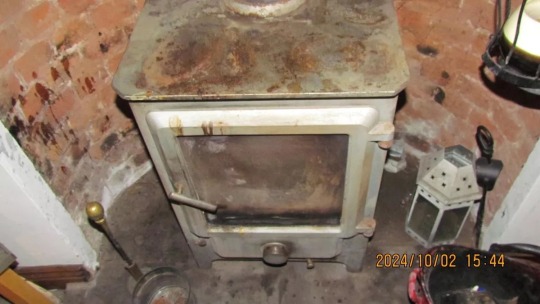
Some of William's tenants are at risk of fuel poverty
About another, he said: “It has also got solid fuel heating and solid fuel room heaters, which is a very inefficient and very expensive way of heating a property. A lot of carbon emitted almost twice the amount on that one was twice the amount of the typical house.
“Because they're using something expensive like wood and electricity, the fuel bills are very, very high indeed. In terms of carbon emissions, this is a very polluting property.” Shown photos of one property, he said: “Wherever you've got large gaps and cracks within the structure of the building, you're going to get draughts … I would expect that property to be pretty cold to live in.”
He added: “With these EPCs that I've seen today, it's quite clear to me that they shouldn't be rented out until they comply with either the minimum energy efficiency standards or they have a valid exemption on the exemptions register.” None of the 70 properties with F and G ratings had exemptions in place but we understand the Duchy considers that the rules do not apply to properties where the same tenant has lived there for many years and the EPC was done “voluntarily”.
Breaches of the MEES regulations can be penalised with fines of up to £5,000 per property. Our investigation with Channel 4’s Dispatches raises serious questions over the environmental record of the Duchy, which is owned by the heir to the throne.
The Duchy of Cornwall website states that the “Dukes of Cornwall have traditionally managed their own estates … Over the last few years, HRH Prince William, the current Prince of Wales, has worked with his father managing the estate and has now taken over full responsibility for the estate leadership.”
King Charles III, who owned the Duchy until September 2022, is a longstanding champion of environmental issues, while Prince William launched the Earthshot Prize in 2020 "to search for and scale the most innovative solutions to the world ’s greatest environmental challenges". Since the new rules came into force on EPC, Charles and William have between them received £91m in profits from the Duchy.
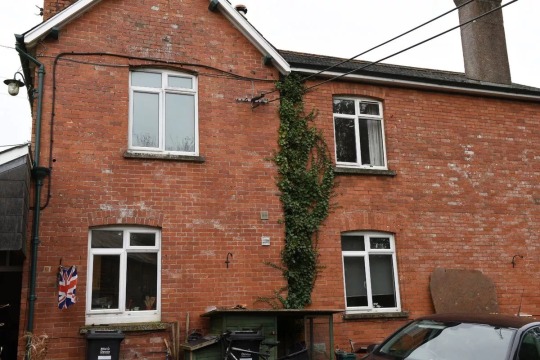
Claire's home in Devon ( Image: MIKE ALSFORD/MWP)
There are a series of “exemptions” from the MEES regulations available to landlords. Our research shows the Duchy has applied just 10 times for exemptions and the most common reason, used four times, was that the work would cost more than £3,500 to complete.
Campaigner Jonathan Bean, a spokesperson for Fuel Poverty Action, said: "It's a disgrace that a billion pound royal estate appears to be acting like a rogue landlord. And getting away with it. King Charles and Prince William have profited from renting out property that fails to meet even basic standards.
“These low standards cause misery by making heating unaffordable, leading to major health risks from cold and mould. F and G rated homes can cost three times more to heat, which is unaffordable for those on lower incomes.
"Renters are scared to complain about grim conditions, for fear of being evicted or subjected to rent increases. People are forced to suffer in silence. This royal mess demonstrates the fundamental power imbalance at the heart of this country’s broken housing system. Tenants may have rights in law, but in reality they are at the mercy of their landlords.
"We hope this investigation will spark the urgent action needed by Government to force the Duchy and other landlords to actually meet basic standards, and end the misery of people stuck in cold, damp and mouldy rental homes." Definitions of fuel poverty vary. One measure is a household that spends more then 10% of its income on heating - another refers to poorer household with an EPC rating below D.
In 2020, the year the rules on not renting properties below an E came into force, the Government found that 4.4% of rental properties were “non-compliant”. The latest from the Office of National Statistics found that just over 1.5% of rental properties are an F or a G but these include those with an exemption in place. In comparison, 14% of the Duchy rentals we found were rated F or G - nearly ten times higher.
Are you living in an inadequate royal property? Email [email protected].
The King, the Prince & Their Secret Millions: Dispatches’ on Channel 4, 8.10pm and afterwards on channel4.com.
48 notes
·
View notes
Text
in light of the current olympics I'd like to make a throwback complaint of what did horikoshi mean by the UA sports festival replaced the olympics? the olympics are an international sports competition to promote global diplomacy (because if you duke it out in the arena you dont have to duke it out on the battlefield). so how? in the world?? did a single high school in japan whose festival doesnt even have real sports replace??? an international competition???? im just gonna pretend that japan just dropped out of the olympics in this universe. oh my god its like if phillips exeter academy put on a wipeout game every year and said it was more important culturally than the olympics. get real!!
88 notes
·
View notes
Text
CHAUMET ART DECO DIAMOND TIARA

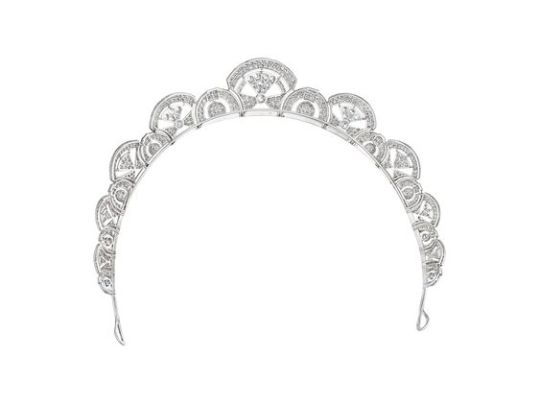
"Property from the Collection of Margaret Thompson Biddle
CHAUMET ART DECO DIAMOND TIARA Old-cut diamonds, platinum (French marks), circa 1930, maker's mark.
Margaret Thompson Biddle was born in Helena, Montana in 1896. She was the daughter of notable copper miner and financier, William Boyce Thompson.
Margaret’s father was born and raised around mining in Montana, so it was no surprise that he went on to make a name for himself in the copper mining industry. He attended the prestigious Philips Exeter Academy in New Hampshire, and Columbia University. After retiring from the New York Stock Exchange around 1915, Thompson’s interests returned back to mining where he founded the Newmont Mining Corporation.
Margaret Thompson married Anthony Drexel Biddle Jr. in 1931. That year he was also appointed the Minister to Norway by President Roosevelt, and then Ambassador to Poland 1937. This role led Biddle and his family all over the world. After fleeing Poland in 1939, they landed in England for one of Anthony’s commissions. In this position, he worked with the governments-in-exile of Belgium, Czechoslovakia, Luxembourg, the Netherlands, Norway, Poland and Yugoslavia. Biddle held numerous ambassador positions in the years that followed before re-enlisting in the army in 1944.
Margaret relocated to France after she and Anthony separated at the end of World War II. She had a home on the French Riviera, and a spectacular hotel particulier on the notable boulevard St. Germain in Paris. Not only was she a writer and author of The Women of England, Margaret was also known to be quite the hostess and socialite. One could find the Eisenhowers, the Duke and Duchess of Windsor, and many other notable French creatives at her soirees.
In addition to having a wonderful jewelry collection, Margaret was an avid collector of fine porcelain, silver, home furnishings and art by the most distinguished artists and makers. She gifted a 1,575 piece dinnerware service to former First Lady Eisenhower. Select pieces of the ‘Vermeil’ collection are still on display at The White House present day."
- Christies
#tiara#tiaras#diadem#diadems#hair piece#hairpiece#headpiece#head piece#head ornament#headornament#hair ornament#hairornament#diamond#diamonds#platinum#chaumet#christies#christie's#tiaras crowns#tiarascrowns#tiara crown#tiaracrown
59 notes
·
View notes
Text


The Duke of Cornwall visited East Shallowford Farm in October, arranged by the Duchy of Cornwall. (Photo Courtesy : Dartmoor Farm Cluster) | 17 OCTOBER 2024
During the visit, he met with staff from The Shallowford Trust and students from Barley Lane School in Exeter. He also spoke with members of the Dartmoor Farm Cluster and the Central Dartmoor Landscape Recovery Project team.
#british royal family#british royals#royalty#brf#royals#royal#british royalty#prince of wales#the prince of wales#prince william#william prince of wales#royaltyedit#royalty edit#my edit#102024#Dartmoor24#william wales
28 notes
·
View notes
Text
The official records of the proceedings of the parliaments of 1410 and 1411 provide more positive indications that this was indeed the case. Moreover, they contain a number of hints that the principal issue at stake was not so much the composition of the king’s Council as the political and constitutional position of the king himself in the light of his increasingly uncertain health and the attainment of maturity by his able and forceful heir-apparent. Early in the parliament of 1411, Henry IV informed Thomas Chaucer, the Speaker, that "il ne vorroit aucunement avoir nulle manere de novellerie en cest parlement, mais q’il vorroit estre et esteer en ses libertee et fraunchise auxi entierment et a large come aucunes de ses. . . progenitours." At the end of the parliament the king not only reiterated these sentiments at length, but annulled an article which had been drawn up in the parliament of 1410 and which was described on the Roll as the "restreint fait au darrein parlement". Then, in a petition presented by the Lords and Commons, it was stated that "graund murmur ad este en vostre poeple, que vous avez en vostre coer pesantee envers aucuns de voz lieges venuz . . . a cest Parlement, et a vostre darrein Parlement." Henry was asked to reassure the petitioners by declaring that he considered all those who had been involved in these two parliaments to be his faithful and loyal lieges. These statements imply beyond reasonable doubt that Henry believed that certain developments during the two years of the prince’s ministry had posed a very real threat to his prerogative, and that he needed to take positive action to forestall some new encroachment upon his authority. Though only one chronicle claims that there was an attempt to procure the king’s abdication in the parliament of 1411, it seems that something not much less dramatic was in men’s minds. When Henry spoke of ‘novelty’, he presumably expected his audience to have some idea of what he meant.
Furthermore, even without the hindsight provided by the record of 1411, there are a number of suggestions that Henry was unhappy about the change of ministry early in 1410, His delay of five weeks before appointing a successor to Arundel; the fact that the new chancellor, Thomas Beaufort, was not appointed until after the beginning of parliament; the appointment of Thomas rather than the more ‘obvious’ Henry Beaufort, who had already delivered the opening address to the parliament; the king’s stern reminder to the Commons that parliament had been called to serve the common good of the kingdom and to act in a spirit of unity; the delay in the naming of the new councillors; and the king's announcement that certain men were unwilling to serve on the new Council, may all have indicated that Henry was unable to conceal his reluctance to accept the political changes in which his eldest son figured prominently. And apart from the cryptic mention of the 'article of restraint', there are signs that the prince and his colleagues exercised, or attempted to exercise authority independently of the royal will, including, as will shortly be noted, in the critically sensitive field of foreign policy. Henry's reassertion of his authority in the parliament of 1411 appears to have foiled an attempt by the prince and his allies to regularize and strengthen the degree of control over public affairs which they had wrested from the reluctant king nearly two years earlier. The almost total failure of the chroniclers to provide the details necessary for a fuller understanding of the Parliament Roll's carefully veiled account of one of the most crucial sequences of events in the relations between Henry IV and his eldest son is certainly exasperating, but perhaps also significant. When, therefore, apparently independent sources state quite categorically that there was trouble between the king and Prince Henry in 1412, it may be assumed that the dissension was so openly aired and so well remembered that even writers well-disposed towards the prince felt obliged to record it. It is these accounts which might be expected to throw most light upon the political and personal stresses of the closing years of Henry IV's reign.
Peter McNiven, "Prince Henry and the English Political Crisis of 1412", History, vol. 65, no. 213 (1980)
(very rough translations of the French phrases:
il ne vorroit aucunement... : he in no way wanted to have any kind of novelty in this parliament but he would like to enjoy his freedom as fully as widely as previous parliaments.
restreint fait au darrein parlement: restricted to the previous parliament
graund murmur ad este...: a great murmur has come from your people that you have a heaviness in your heart towards some of your people, this is your parliament. )
#henry iv#henry v#archbishop thomas arundel#cardinal henry beaufort#thomas beaufort duke of exeter#the political crisis of 1412#historian: peter mcniven#thomas chaucer#father and son
5 notes
·
View notes
Text
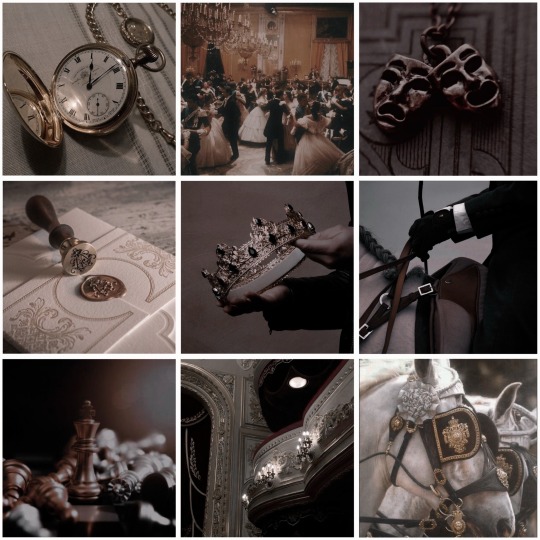
CHARACTER BIO
Edward/Edwina Drake, Duke/Duchess of Exeter (gender selectable pronouns & 26 years): the perfect embodiment of what a royal partner should be. With a charming and sweet smile, a gracious hand to help others, and a sense of duty that emulates through them. They’re the loving royal that kisses babies and hands out food to the needy. The best on paper match to your parents, to the Ton, and to the nation.
Personality: Warm, kind-hearted, intuitive. They were raised to be the best next in line for their duchy and potentially the crown.
Physically traits: E is biracial, half European and Romani. They have an olive complexion, dark brown curly hair, with alarmingly beautiful hazel eyes. They have a beauty mark under their left eye. Male!E is 5’10” with an average/built body. Female!E is 5’5” with an average/slim built body.
#interactive fiction#interactive game#if wip#choice of games#cog#hosted games#character bio#the heart of the heir
27 notes
·
View notes
Text
Now I’m Covered In You [Chapter 2: Dusk]

Series summary: Aemond is a prince of England. You are married to his brother. The Wars of the Roses are about to begin, and you have failed to fulfill your one crucial responsibility: to give the Greens a line of legitimate heirs. Will you survive the demands of your family back in Navarre, the schemes of the Duke of Hightower, the scandals of your dissolute husband, the growing animosity of Daemon Targaryen…and your own realization of a forbidden love?
Series title is a lyric from: Ivy by Taylor Swift.
Series warnings: Language, sexual content (18+), dubious consent, miscarriage, pregnancy, childbirth, violence, warfare, murder, alcoholism, sexism, infidelity, illness, death, only vaguely historically accurate, lots of horses!
Word count: 4.0k.
Link to chapter list (and all my writing): HERE.
Taglist: @borikenlove @myspotofcraziness @ipostwhatifeel @teenagecriminalmastermind @quartzs-posts @tclegane @poohxlove @narwhal-swimmingintheocean @chainsawsangel @itsabby15 @serrhaewin @padfooteyes @arcielee @travelingmypassion @what-is-originality @burningcoffeetimetravel @blackdreamspeaks @anditsmywholeheart @aemcndtargaryen @jvpit3rs @sarcastic-halfling-princess @flowerpotmage @ladylannisterxo @thelittleswanao3 @elsolario @tinykryptonitewerewolf @girlwith-thepearlearring @minttea07
Let me know if you’d like to be added! 💜
The girl is from Milan, and Daeron is enamored with her: bright-eyed, beaming, blood rosy in his cheeks. Her name is Nicolosa, though she is adamant that everyone should call her Nico. She is one of those effortlessly informal people. She laughs too loudly and says all the wrong things, too-honest observations that would be offensive if the person breathing life into them was anyone but her. She spins around the hall as violins and lutes play, swinging from the willing arms of chuckling noblemen, an aisle of light in a goldenrod gown, the sun made flesh. She has the luxury of dancing until breathless, until she glows with the sheen of exertion. She could not possibly be carrying a child; she will not be wedded and bedded for another year.
This is a great triumph for Otto the Duke of Hightower. Milan under the House of Sforza is an enviable ally, wealthy and sophisticated, and eager for friends who will one day be willing to assist them in resisting French encroachment. This is the deal that the Duke of Hightower has struck. True, Daeron is still rather young to take a bride. True, Nico’s parents, the Duke and Duchess of Milan, were insistent that they would concede to the match only if the marriage and consummation was postponed until next August. True, this does not resolve the immediate concern of Aegon’s lack of an heir. But it is another tile of a mosaic, another thread in the patchwork of the Greens’ objectives, another brick in a castle wall from which boiling oil could be poured down upon invaders.
The Duke of Hightower is accepting warm congratulations from the nobility of Southern England: Norfolk, Gloucester, Somerset, Buckingham, Suffolk, Clarence, Exeter. Those of the North—Lancaster, York, Stark—shun him. They stand instead with Rhaenyra, admiring her two eldest sons, pretending not to notice how little they resemble the late Laenor Velaryon. The Crown Princess is wearing black accented with maroon, as she almost always is. She sends a small, reassurance-seeking smile to where Daemon sits at the high table, and he raises his cup to her, his face sly, arrogant, proud. They love each other, this is clear; it may not be an especially conventional love, and it may be a love that emboldens rather than tames, but it is love nonetheless. This does not make your resignation to your own fate any easier. Queen Alicent, laughing as she joins Daeron and Nico dancing, is dressed in dark green to match her father and her children. You often wear purple, the color of royalty…just to remind people that you still deserve to be here.
You are at the high table too, albeit on the opposite side from Daemon; the Blacks are always seated to King Viserys’ right, while the Greens are on his left. Aemond doesn’t dance, you aren’t permitted to, Aegon is too drunk. He’s apparently not too drunk to leer, however; his bleary storm-blue eyes follow Lady Joanna Montford as she glides across the floor like a shark through surf, flashing luring eyes and flirtatious simpers. You’re a better dancer than she is, but of course that doesn’t matter, because no one ever gets to see you do it. Aegon won’t go so far as to touch her in public—he would consider that discourteous, you think—but he’s sleeping with her, and everyone knows he’s sleeping with her, and you can’t even truly wish he’d stop because you don’t want him in your bed anyway. But the humiliation of it…the hopelessness…that is more difficult to come to terms with.
“Portugal,” Daemon tells Aegon nonchalantly. “You could have married some princess from Portugal.”
Aegon guzzles his wine and says nothing. Aemond—scribbling messy lines of black ink onto parchment at the end of the table—glances up at you and then back down again.
Daemon continues: “The Infanta Maria was wed around the same time you were, and she’s produced a more than satisfactory son for her husband. Hugely fat, practically hoglike, I’ve seen portraits.”
“Daemon, please,” King Viserys scolds mildly, smiling as he watches Rhaenyra mingle with nobles who wouldn’t mind burning you alive if it meant the Blacks would ascend more seamlessly to the throne. The king has her son Joffrey in the chair next to him and has enthralled the boy with stories of jousts, hunts, feasts, Christmases and May Days. You wonder if he’s ever shown such interest in any of his children with Alicent. If he has, you aren’t aware of it.
“Or Savoy,” Daemon says. “Not as cultured as Milan, this cannot be denied, but of great strategic significance geographically. One foot in France, the other in Italy. I’ve heard wonderful things about Princess Louise. Very athletic, very…” He smirks, biting into a pomegranate. Ruptured seeds spurt juice like the gleam of rubies. “Flexible.”
“Oh, look, Prince Daemon.” You point into the crowded hall. “I think your wife is beckoning you to join her. Your third wife, I mean, the most recent one. The one who also happens to be your niece.”
“Or Naples!” Daemon exclaims, as if it has just occurred to him, as if he hasn’t been waiting to torment you like a wolf shadows a wounded stag, saliva filling up its mouth, fangs bared and dripping. Southerners detest Daemon because they fear he is mad; but that’s exactly what the North likes about him. “Or perhaps even—would we dare to hope?—a princess of France! Think of it! The poor Duke of Hightower would not know what to do with himself, he would be so delighted. At his age, the shock might just kill him.”
“Daemon,” King Viserys warns again.
“Perhaps you shouldn’t be giving us so many ideas,” Aegon says, slurping his wine. “Aemond is still unspoken for, and now we have a tidy list of candidates to consider. How thoughtful of you.”
“Or you simply could have made the same arrangement that you did but in reverse,” Daemon goes on as if no one else has spoken at all. “You could have taken a Castilian bride, and Helaena could have been shipped off to the Pyrenees, and your circumstances would be wildly different than they are now. Princess Lucia would have been the right age for you. Do you want to know what she gave to her new husband this past Christmas?”
“I surely don’t,” Aegon replies.
Daemon grins beneath glinting eyes. “Twins.”
“Enough,” Aemond says, dark and quiet like midnight.
Now Daemon addresses you, resting his elbows on the table. “How many more chances do you think they’ll give you, Navarre, before some providential technicality that voids your marriage contract is discovered and you are discarded of in a nunnery?” Another bite of the pomegranate; another freckling of bloodlike red across the tablecloth. “The globe is crawling with royal women, they’re fish in a barrel, why would anyone jeopardize their dynastic ambitions for you?”
“My wife belongs where I am,” Aegon says: a fact, a dare. “And I will hear no more of it.”
You look at him, grateful but a little stunned. He does this sometimes. He will choose a seemingly arbitrary moment to make a show of loyalty, and then he will never mention it again. He doesn’t return your glance. Instead, he picks apart a roasted chicken carcass with his fingers and resumes staring at Lady Joanna Montford with his dazed, watery eyes. Aemond, engrossed in his writing, hasn’t eaten much tonight. Neither have you; but there’s a reason for that.
“Where you are,” Daemon muses, raising his strange white eyebrows. “Well, I hope she enjoys brothels.”
You fling back: “Like the one you fondled the Crown Princess in?”
“A baseless rumor,” Daemon replies, but he can’t smother the flare of wicked pride in his eyes.
“Will you stop it?!” the king roars at both of you. Joffrey gazes up at him with awe, like he’s seen a falling star or a dragon or the face of God. “This is supposed to be a joyous occasion, a royal betrothal, and you can’t conduct yourselves appropriately for one night—?!”
“What are they squabbling about?” the Duke of Hightower asks as he approaches the table. He can summon nothing more condemnatory than half-serious annoyance; his mood is too lofty, his victory too fresh. Behind him in the festive ruckus, Queen Alicent and Rhaenyra are exchanging awkward compliments and trying to ignore all the enmity that has stacked up between them since the king married his daughter’s lifelong companion and started producing white-haired children with her. Jace is dancing with Baela, Luke with Rhaena; Daeron and Nico have found themselves alone in a corner, giggling as candlelight glows hot and golden on their flushed cheeks.
Rather than answering, the king merely rolls his eyes and sighs, exasperated.
“You must be overjoyed, Otto,” Daemon says. “Another friend on the Continent. And yet, they are awfully far away, don’t you think?”
The Duke of Hightower smiles tightly. “Ships travel fast.”
“Ah, perhaps, though not faster than word from here to the Scottish border.”
“The Milanese girl will make a lovely bride for young Daeron, Otto,” King Viserys praises. He has either successfully deluded himself into believing that the whole of the realm will miraculously coalesce behind Rhaenyra upon his death, or he is determined to ignore the catastrophe that will ensue once he slips, gleefully ignorant, off into the afterlife.
Daemon nods. “Yes. Buxom, vivacious, amiable, she will be a fine mother someday. Unlike certain other people among us.”
Aegon says around a mouthful of chicken: “Grandsire, Prince Daemon was kind enough to point out all the other advantageous matches still at our disposal. Since we haven’t monopolized our bloodline by marrying exclusively immediate relatives.”
The Duke of Hightower chuckles. “Yes, I do sincerely hope that Jace and Luke’s offspring don’t all end up with fifteen fingers or gills or some such thing.”
“Fortunately, Harwin Strong’s blood should dilute the lineage,” you say.
Daemon turns towards you, twisting in his chair, grinning cruelly. “Gills or not, at least they’ll have children.”
You can’t think of anything to say back. Perhaps there is nothing to say. The Duke of Hightower and Aegon both avert their eyes. King Viserys has returned his attention to young Joffrey and is teaching him a prayer to invoke the protection of Saint George. Only Daemon looks at you; and Aemond watches him, quill hovering in midair, his sole blue eye a blaze of cold fire. You push out your chair and rise from the table, fleeing to one of the rooms adjacent to the exuberant, cheerful hall. You’re happy for Daeron and Nico, truly you are. But pain has a way of feeling heavier than joy, doesn’t it? It grips onto your ankles and drags you down into depths that nobody else can see.
The room is small and empty, the music muffled by the walls. Through the stained glass windows trickle in beams of pink-lavender light as dusk falls over Westminster Palace. And you stand there alone in the twilight, thinking of the past and the future and time itself, a ghost that will always be made of more secrets than answers.
You hear the door open behind you. “I’ll return to the festivities in a moment,” you say to the intruder, trying to keep the emotion from your voice.
“No need,” Aemond replies softly.
You wheel, and there he is, walking to meet you in the vanishing daylight. He takes your left hand in his and settles his right lightly, modestly, on your waist. “What—?” And then you understand.
Dancing. Here, where no one can see to forbid or ridicule. He’s come to take me dancing.
You smile up at him. “I’m not supposed to be doing this.”
“We’ll go very slowly.”
And slowly would be an understatement: you and Aemond move together in dawdling, careful steps, rotating like seasons, like the phases of the moon. He smells like he always does, of work and effort: smoke, leather, that scent he wears that is dark and woodsy and with an edge like a knife. His hands are calloused from sword sparring. Yours feel soft and helpless in his; they weren’t always so fragile, but they are now. “I thought you hated me,” you tell him.
“I’ve never hated you.”
“But you ignored me. For an entire year after I arrived in England, you ignored me.”
“I kept my distance. That’s very different from ignoring.”
“Alright, but why keep your distance at all?”
Aemond hesitates. “I am not in the habit of allowing myself to be noticed.”
“Because you fear people will see through the armor you’re wearing?” And when he abruptly stops dancing, you add: “I don’t mean that unkindly. I’m the same way. I wear all sorts of masks.”
He studies you in the lilac light. His gaze falls from your eyes to your lips to your throat. And then he resumes the unhurried dance. “There’s nothing about you worth hiding.”
You spin away from him and then return to be caught. “And you think you are a trove of scandalous secrets, Prince Aemond? Is that what’s in all those poems you won’t let me read?”
“If they were any good, I’d let you read them.”
“But you have the disposition of a genuine poet. Enigmatic, perceptive…” Alluring. Beautiful. You cast those thoughts away like coins into a wishing well. “Graceful.”
“So the dancing isn’t too terrible. I don’t do it often, I’m afraid.”
“You don’t do it ever to my knowledge. And no, not terrible at all.”
“I move best when holding a sword, not a princess.”
“I used to have callouses like yours, you know,” you say. “My palms and fingers were covered in them.”
“Because you sparred with your brothers,” Aemond remembers.
“For hours and hours. Especially with Alonzo. He’s the exact opposite of you, short and stocky and loud, with dark curls and heavy feet. And his poetry would send a lady sprinting in the other direction.”
“Do you miss it? Terrorizing men with swords?”
“Of course. I was almost somewhat good at that, unlike everything I’m tasked with here.”
Aemond grins, broad and mischievous. “Let’s have a demonstration then.” He releases your hand, goes to the door that leads to a stairwell, and waits patiently for you to join him.
This is improper. This is disobedient. But what has being obedient gotten you lately?
You follow Aemond through the doorway, down the stone steps, and out into the courtyard illuminated by dusk like amber, tiger’s eye, amethyst, rose quartz. It is empty except for the two of you; the rest of the palace is thoroughly occupied with drinking, dancing, and murderous scheming. It is a wonder with as lethal as the world is that women are meant to be so powerless. Aemond trots across the grass towards the blacksmith’s forge at the far end of the courtyard, then returns with two swords. He passes you the lighter one.
“How does it feel?” he asks you.
You twirl the sword a few times, admittedly rather inexpertly. “Wonderful. But I’m very out of practice.”
“Fear not. We’ll take this slow as well.” He taps his blade against yours, so tenderly it’s laughable; the sound it makes is blunt and low. Still, you’re both smiling as you circle each other, striking out with intentionally ineffectual thrusts and lunges, blocking, parrying. “Your footwork is excellent,” Aemond notes.
“It used to be better. But I appreciate your compliment. You’re more talented than Alonzo. Then again, you probably spend much less time skipping lessons to chase women around.”
“Undoubtedly,” Aemond says in a tone you can’t decipher. Then he asks, interest piqued: “What sorts of masks do you wear?”
You shrug, your blade skating down the length of his. “All sorts.”
Aemond parries. “I’d be interested to know.”
“A genuine poet would be astute enough to sift out the truth from the lies.”
“So lie to me,” Aemond says, his stare direct and bold, his sword balanced in one hand and pointed at your ribs, your heart. “And we shall find out if I can tell.”
You side-step him, thinking of frivolous diversions. “I love English ale and drink it all the time.”
“Lie. Apple cider.”
The blades clang. “My favorite color is, dutifully, green.”
“Lie. Red, like the flag of Navarre.”
And like blood. “It’s beginning to lose its charm,” you confide in Aemond.
“Don’t do that,” he says severely. “Don’t let them take something you’re proud of away from you.”
You consider him as stars rise in a violet sky. “Why are you encouraging my rebellious inclinations? You don’t give the impression of being much of a rule breaker.”
“I don’t see what good can come from you being denied any source of happiness,” he says simply. “Go on. Let’s have another attempt at a lie.”
You block Aemond’s benign, cautious swing as you circle him. “I’m pregnant again.”
Aemond halts; every muscle in his body goes still and inflexible. And he knows immediately that you’re telling the truth. “I’m…I’m very glad to hear that,” he manages at last.
You laugh fleetingly, cynically. “You can’t even properly congratulate me. No one can. Because everything’s gone so horribly thus far, people don’t want to get their hopes up.”
“Does anyone else know?”
“Not yet. But I can recognize the first signs by now.” Constant low-level nausea, difficulty waking in the morning, dull cramping. You force a thin smile. “At least your brother won’t need to visit my bed for a while.”
“You don’t find pleasure with him? Is Aegon not…” Aemond searches for the right word, nervous, bashful. Hot blooms of blood appear in his cheeks. “Attentive to you?”
“It’s not his fault. He tries, really. He’s never been selfish or rough. It is entirely my own deficiency. I’m just not…at ease with him, I suppose. I can’t relax enough. I can’t reach…well…” Euphoria? A climax? A peak? You know what euphemisms others use, but it’s difficult to describe something you’ve never experienced before.
Aemond nods, meaning that he understands, that you don’t have to wrench the words out of you like entrails from a slaughtered animal.
“I know that other women can,” you say, tapping your blade against his. “That their husbands are well-matched with them and that they enjoy great pleasure. It’s difficult for me to accept that isn’t something I’ll ever get to have myself. At least…I don’t believe I’ve ever had it.”
“I think you’d know if you had.”
“Oh, and you’re an expert in a woman’s pleasure, are you? As an unmarried prince?” Your voice is casual and teasing; but the thought of him with a lover is like a bolt of lightning. It pains you, it paralyzes you, it hits you without any warning.
“Years ago, Aegon paid for a woman to…initiate me,” he explains. “Several times. He meant it as an act of compassion, I think. I was speechless around anyone I found desirable.”
Your nausea swells from a ripple to a wave. “Oh. I see.”
“It’s not something that I especially wanted at the time, and it’s not something that I have cared to repeat since. But it was very…informative.”
He gives you an infinitesimal little half-smile, and something passes between you as the last threads of dusk are unwoven from the sky and night engulfs Westminster Palace, something like a promise, a note, a whisper. The queasiness in your belly vanishes and is replaced by something else: a sensation like falling, like wanting. You are overcome by an ache to say something, though you don’t know what.
“What the hell are you doing?!” the Duke of Hightower bellows, striding out into the courtyard. Aemond takes several swift steps away from you and hurls his sword to the ground. You toss yours away as well.
“Grandsire, the princess and I were just—”
“You!” the Duke of Hightower shouts, turning on you first. “You should be in a chair or in bed, you should be resting, you should be thinking only of your health and of the wellbeing of the heirs you will produce with Aegon, not gallivanting around in the darkness and playing with swords, of all things! What would your husband say? What would your parents say?! Are you what we were promised when we signed that godforsaken contract?! Surely, princess, at this very moment you are not.”
Aemond begins: “Grandsire, it wasn’t her idea—”
“And you,” the Duke of Hightower growls at him. “You will immediately rid yourself of your baffling aversion to marriage, because you’re next, Aemond. Be prepared to discuss the candidates tomorrow and decide upon your preferred bride. Your brothers and sister are spoken for. We have one last card to play, and it cannot wait any longer. Not with this enduring…” He glances bitterly at you. “Uncertainty.”
Since you arrived in England, there have been innumerable discussions of who Aemond will marry, and he has staunchly evaded every proposed match. His rationale has wavered from needing to focus on his studies to committing himself to training as a warrior to interrogating the strategic wisdom of each potential alliance. This is strange for a man who is otherwise so constrained by familial loyalty, so devoted to the advancement of the Greens. “I won’t even get to meet her first?”
“You’ll learn to like her. Daeron met his betrothed today and he is happy.”
“Daeron is lucky,” Aemond objects. “I might just as easily not be.”
“You will marry,” the Duke of Hightower insists. “Without protest and without further delay.”
Aemond looks down at his empty hands—lines and callouses, fresh scars and ancient heritage—and he says quietly: “Do you care nothing for love?”
“Have you ever wondered why the old put so little stock in love, Aemond?” the Duke replies. “It’s not because we don’t believe it’s real. It’s because we know it doesn’t last. Women die in childbirth. Men die at war. Thousands die of Plague or the bloody flux. People who once would have killed for you grow to hate you, or worse, feel nothing for you at all. Love is transient and painful and changeable and destructive. Best to skip over such things and think of legacy instead. That’s all any of us are left with in the end.”
And then the Duke of Hightower clasps your wrist and leads you back inside the palace, gently, as if you are made of glass.
~~~~~~~~~~
It is several hours later when Aegon staggers noisily into your bedchamber, knocking over a Florentine vase by the door. Shards of it tumble across the floorboards like wounded men littering a battlefield.
“Sorry,” he slurs, pulling off his tunic and then the plain white shirt underneath. “I’m very drunk, wife, I cannot deny it, but there’s only one part of me that you’re in need of and I think that I can still get it up—”
“Aegon.” You’re lying in bed and sipping a cup of apple cider. “You don’t need to stay. Your part is done.”
He stops cold and blinks at you, comprehending it sluggishly. His eyes flick down to your belly, covered by a blanket decorated with green roses. “Oh.”
“It’s alright. You can go now. You have other places to be, and I know that’s what you want.”
“Is there anything I can do for you? To make it easier?”
Be a different sort of man. Be more like Aemond. “No, I’m fine. But it’s very sweet of you to ask.”
“Okay.” He lurches away, stepping on pieces of the shattered vase. His bare feet leave stains of blood on the floor. And then he pauses under the doorframe, gripping it so he doesn’t fall over. “Wife?”
“Yes?”
“It’s not that there’s anything wrong with you, you know,” he says. “It’s the pressure of it all. It’s the responsibility. I don’t have to feel that when I’m with anyone else.”
I don’t wish he was more like Aemond. I wish he WAS Aemond. “I understand, Aegon.”
He gives you a pitiful, off-kilter, childish smile. “Goodnight,” he says just before he leaves, clutching the doorframe with clawed hands. And then: “Goodnight to both of you.”
326 notes
·
View notes
Text

Arms of The Most Noble John Holland, 1st Duke of Exeter.
15 notes
·
View notes